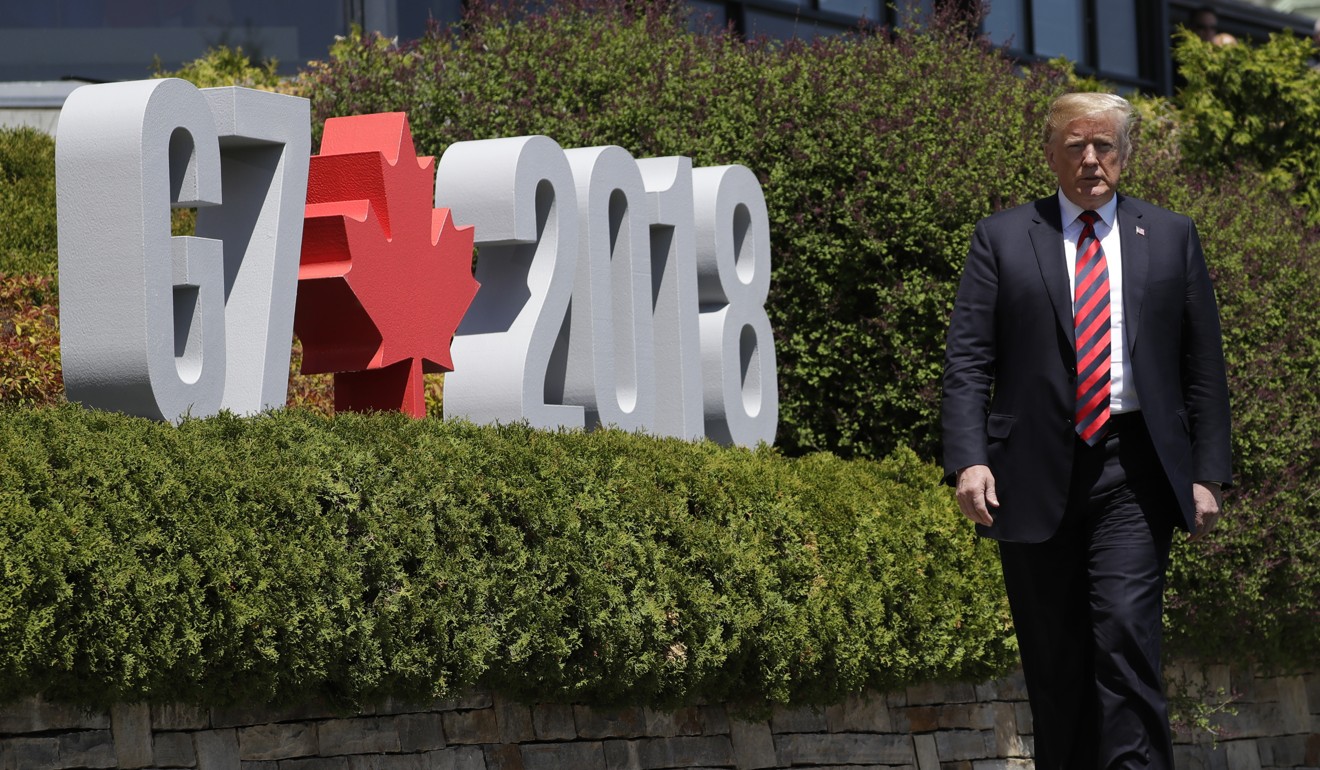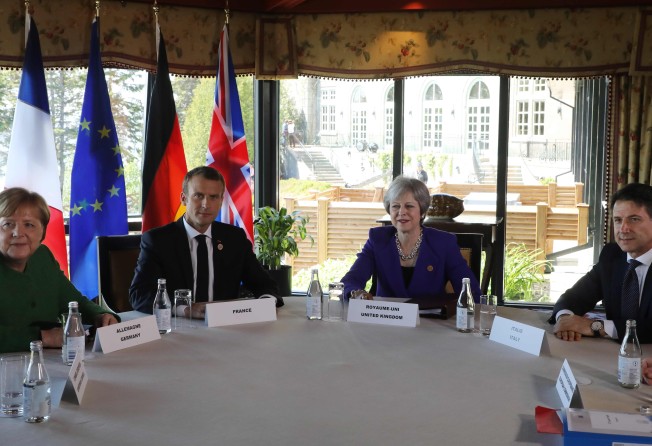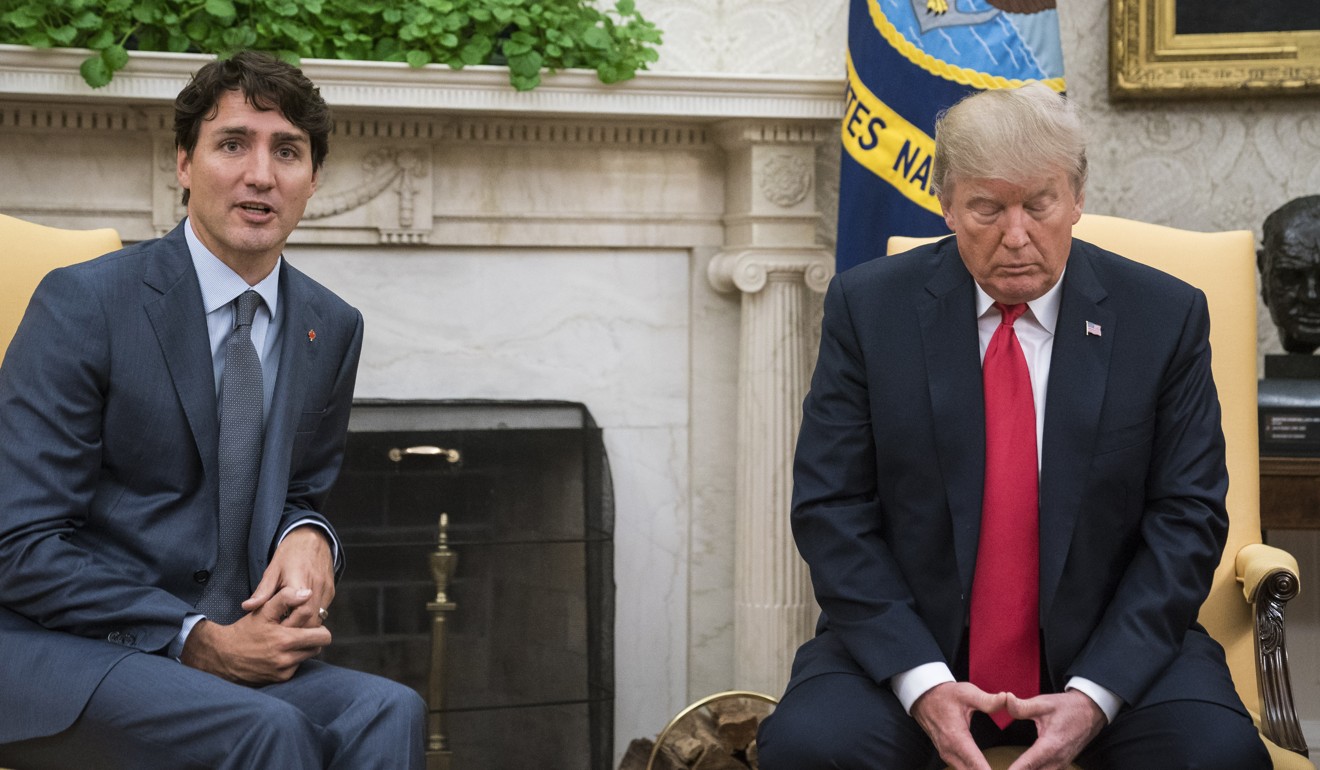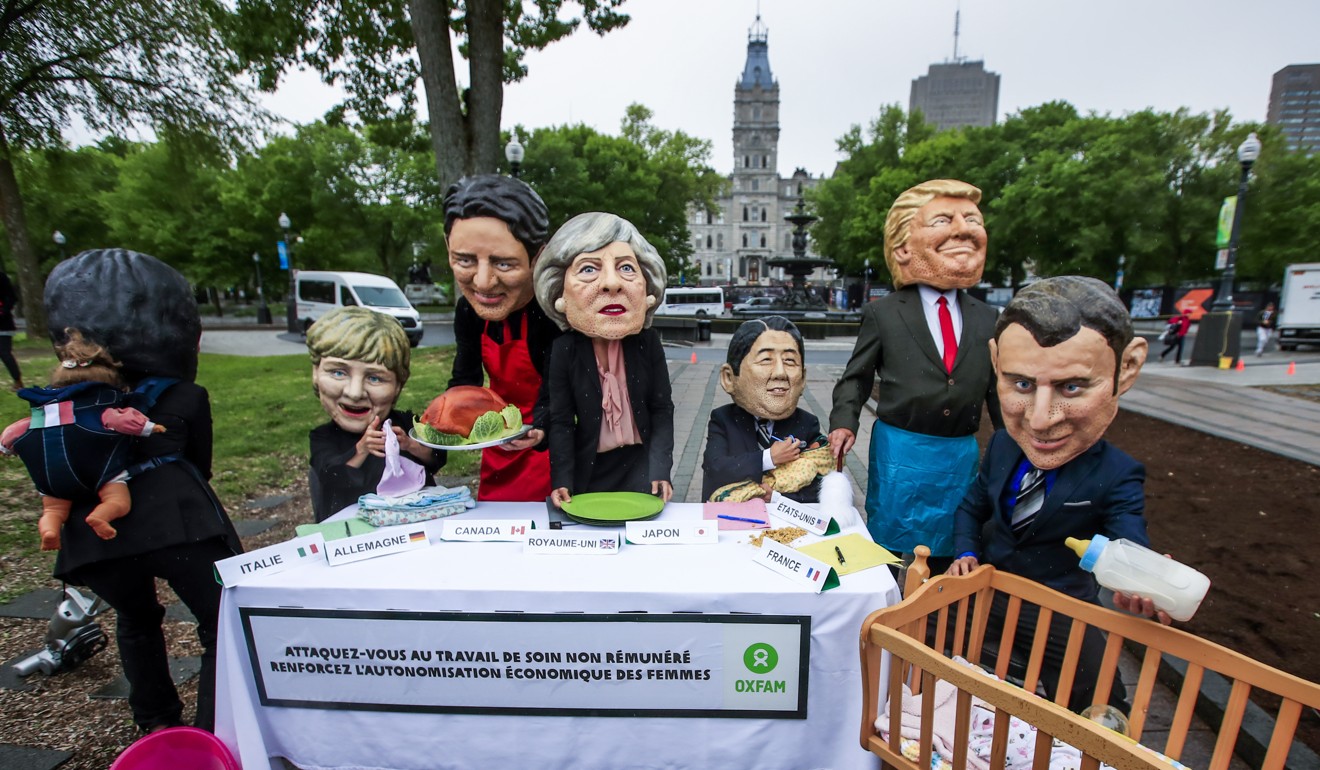
Europeans unanimously oppose Donald Trump’s call for Russia to re-enter G7 as allies reach ‘new level of crisis’ over tariffs
Trump will arrive at the annual gathering on Friday but will leave before it ends to to fly to Singapore for his highly anticipated summit with North Korean leader Kim Jong-un

The European members of the G7 unanimously oppose US President Donald Trump’s call for Russia to be readmitted into the club, French President Emmanuel Macron’s office said on Friday.
Macron, German Chancellor Angela Merkel, British Prime Minister Theresa May and new Italian premier Giuseppe Conte agreed on a common stance on Russia during talks together on the sidelines of the G7 summit, which is taking place in Canada.
“The common European position is against the return of Russia,” one senior aide to Macron told reporters, although the leaders did leave open “the possibility of establishing dialogue” with Moscow.
Conte, who is attending his first summit, had earlier indicated that he was in favour of Trump’s proposal to welcome Russia back into the organisation, which it was ejected from after annexing Crimea in 2014.

May – whose government has accused Russia of being behind the poisoning of a former spy in Britain earlier this year – said that the G7 had to be convinced that Moscow had changed.
“We have always been clear that we should engage with Russia. The phrase I’ve used is engage but beware,” she told Britain’s Sky News.
“Let’s remember why the G8 became the G7. And before discussions could begin on any of this, we would have to ensure Russia is amending its ways and taking a different route.”
Trump made his remarks on Friday while departing the White House for what is likely to be a fractious summit with European, Canadian and Japanese leaders.
“I have been Russia’s worst nightmare,” Trump claimed, “but with that being said, Russia should be in this meeting.”
According to Russian state news agency, Sputnik, Kremlin spokesman Dmitry Peskov quickly responded: “Russia is focused on other formats, apart from the G7.”
It comes after Trump, solidifying his solo status on the world stage, lashed out at long-time allies over their critiques of his trade policies and plans an early exit from the annual G7 meeting.
Trump was set to arrive Friday at the annual gathering, held this year at a Quebec resort, but will leave Saturday morning before it is even over to fly to Singapore for his highly anticipated summit with North Korean leader Kim Jong-un.
The White House announced his travel plans after Macron and Canadian Prime Minister Justin Trudeau signalled they will use the event to take a stance against new US tariffs on steel and aluminium imports.
“Looking forward to straightening out unfair Trade Deals with the G7 countries,” Trump tweeted early on Friday. “If it doesn’t happen, we come out even better.”
Prime Minister Trudeau is being so indignant, bringing up the relationship that the U.S. and Canada had over the many years and all sorts of other things...but he doesn’t bring up the fact that they charge us up to 300% on dairy — hurting our Farmers, killing our Agriculture!
— Donald J. Trump (@realDonaldTrump) June 7, 2018
Canada charges the U.S. a 270% tariff on Dairy Products! They didn’t tell you that, did they? Not fair to our farmers!
— Donald J. Trump (@realDonaldTrump) June 8, 2018
Trump also singled out tariffs on US dairy products in yet another scathing tweet directed at Canada just before the summit begins. “Canada charges the U.S. a 270% tariff on Dairy Products! They didn’t tell you that, did they? Not fair to our farmers!”
His fiery Twitter rant came after a joint press conference late on Thursday, where Macron said: “A trade war doesn’t spare anyone. It will start first of all to hurt US workers.” And Trudeau said: “We are going to defend our industries and our workers.”
Trudeau, for his part, said Trump’s action would hurt American workers as well as Canadians.
“If I can get the president to actually realise that what he’s doing is counterproductive for his own goals as well, perhaps we can move forward in a smarter way,” Trudeau said.
Their comments prompted a swift retort from the US leader.

Critics said the growing US isolation is risky at a time when Trump is making diplomatic overtures with North Korea and in the Middle East and could use the support of allies.
Sebastian Mallaby, a senior fellow with the Council on Foreign Relations, described the relationships between the US and the rest of the G7 as at a “new level of crisis”, saying that it was not just about trade but “a general US attitude toward the system.”
Despite the conflict, Mallaby predicted that the countries would still seek to work with the US, calling it “the indispensable country.”
Why isn’t the European Union and Canada informing the public that for years they have used massive Trade Tariffs and non-monetary Trade Barriers against the U.S. Totally unfair to our farmers, workers & companies. Take down your tariffs & barriers or we will more than match you!
— Donald J. Trump (@realDonaldTrump) June 8, 2018
This marks Trump’s second summit of the G7, an informal gathering that meets every year under a rotating chairmanship. The member countries are Canada, France, Italy, Japan, Germany, the United States and Britain. The European Union also attends. Trump is set to hold a series of group and one-on-one meetings, including with Trudeau and Macron.
Under Trump, the United States has abandoned its traditional role in the G7. His predecessors pressed for freer global trade and championed a trading system that required countries to follow World Trade Organisation rules.
Trump’s policies have been more protectionist and confrontational, driven by a perception that the US has been the victim of poorly conceived trade deals.
Relations have hit such a low that a key question now is whether the seven countries can agree on a joint statement of priorities at the conclusion of the meeting.

A gathering of G7 finance ministers days earlier concluded last week with a message of “concern and disappointment” for Trump from the other six countries. France’s finance minister described the group as “far more a G6 plus one than a G7.”
Macron made clear Thursday that the other six countries would not hesitate to go it alone. On Twitter, he said: “The American President may not mind being isolated, but neither do we mind signing a 6 country agreement if need be.”
Tension has been building over a year of policymaking that has distanced the US from traditional allies, including by Trump’s decisions to withdraw the US from the Paris climate accord and the Iran nuclear agreement.
The new tariffs – 25 per cent on imported steel, 10 per cent on aluminium from Canada, Mexico and the European Union – threaten to drive up prices for American consumers and companies and heighten uncertainty for businesses and investors around the globe.
Canada and other US allies are retaliating with tariffs on US exports. Canada is waiting until the end of the month to apply them with the hope the Trump administration will reconsider.
Additional reporting by Agence France-Presse